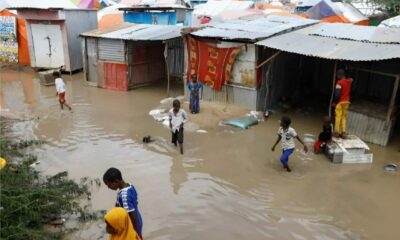NEWS
Philippines Probing 14 Deaths Amid Dengue Vaccine Furore

The country stopped the sale and distribution of Dengvaxia last month after Sanofi, the French manufacturer, warned it could worsen symptoms for people who had not previously been infected with the virus.
Sanofi has maintained the vaccine does not kill people, but did not comment on the health department’s new announcement.
The government has assigned an independent panel of experts to review the cases and expects their findings in one or two weeks, Health Secretary Francisco Duque said.
“We asked them the question, number one: what they think is the cause of death, and then second, do they think it is related to the vaccination,” Assistant Health Secretary Enrique Domingo told reporters.
More than 800,000 schoolchildren received the vaccine last year in the world’s first public dengue immunisation programme.
Dengue was blamed for only four of the 14 deaths being probed, Duque said, with lupus and meningococcemia named as the cause of the others.
But now the panel of experts will verify those reports, the officials said.
“We need to watch out for 837,000 students who have been vaccinated and to us this is paramount,” Duque added.
He also said the government wants to return unused Dengvaxia stock worth 1.5 billion pesos ($30 million) to Sanofi and get a refund.
In November last year, Sanofi released findings of a new study that said showed Dengvaxia could lead to severe infections for vaccinated people who caught dengue for the first time.
The company also urged the Philippine government not to suspend the vaccine’s use, saying it was a crucial tool in fighting the deadly disease.
However, the disclosure triggered a public furore, with some parents blaming the vaccine for their children’s deaths and with a number of legislators accusing the health department of endangering public health.
In a move unrelated to the Friday announcement, the department this week suspended a government clearance for Dengvaxia for one year and fined Sanofi 100,000 pesos (about $2,000).
It ruled that Sanofi did not comply with Food and Drug Administration (FDA) regulations, a finding that the company disputed Friday.
The pharmaceutical giant said in a statement that it had complied with local regulations and FDA requirements.
“Sanofi Pasteur will continue to cooperate in full transparency with the Philippines FDA and is committed to comply with the Philippines laws and regulations,” the company added.
Dengue, a mosquito-borne illness, is a leading cause of serious illness and death among children in some Asian and Latin American countries, according to the World Health Organization.
More than a thousand people died of dengue last year in the Philippines, the health department said.







